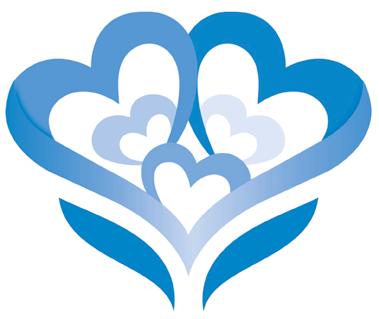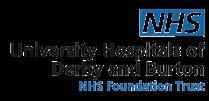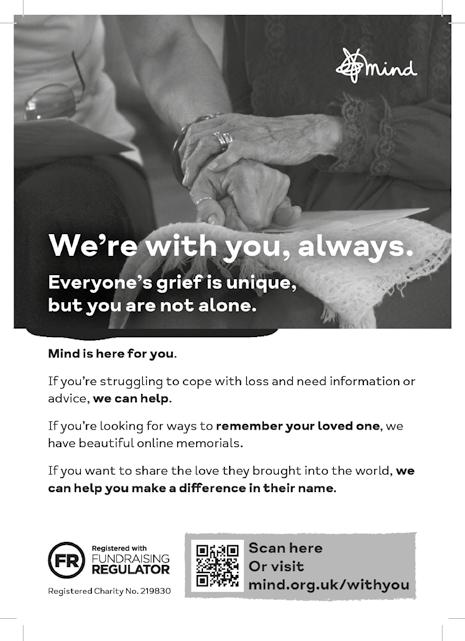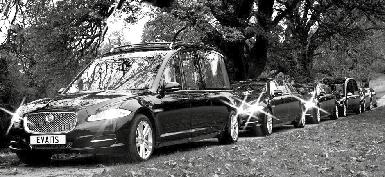

Hospitals of
A practical
about what to
www.uhdb.nhs.uk
University
Derby and Burton NHS Foundation Trust Patient Information
guide
do when someone has died
May we offer you our deepest sympathies
The death of someone you care about is a painful emotional experience. You may feel unsure about the practical things that now have to be done. This booklet contains information and advice that we hope you will find useful at this difficult time.
Please remember that people are here to help. If you need any other information or support don’t be afraid to ask.
What do I do next?
All deaths that occur in the UK have to be registered within 5 days (includes weekends and bank holidays). This requires a medical certificate to be issued that states the cause of death.
When someone has died in hospital a medical certificate will be issued by the hospital or the death will be referred to the Coroner. Some deaths are routinely reported to the Coroner. You will be advised which of these applies to you.
1
Information for relatives
Please telephone the Bereavement Services on 01283 593001. Please ring after 11.30am on the following day (24 hours) to allow time for the paperwork to be completed. The Bereavement Services staff will explain what you will need to do next. They will also help with any questions you may have.
The Bereavement Service is open Monday to Friday 8.30am to 4.30pm. There is no Registrar or Bereavement Service available at the weekend or bank holidays.
A telephone answering service takes your call when the Bereavement staff are out of the office. Your call will be dealt with on their return. Please do not come to the Bereavement Office when the Medical Certificate of Cause of Death (MCCD) is ready. The Bereavement Office will contact you with regard to co-ordinating your next appointment with the Registrar.
You may receive an email from the hospital which will offer you the opportunity to give us feedback. It would be helpful to us if you have any comments, good or bad, on the service that you have experienced here at the hospital. It is through this feedback that we can improve our service.
2
When the Coroner is involved
When the hospital is unable to provide a medical certificate, the death will be referred to the Coroner for investigations which are required by law without the agreement of relatives. The death cannot be registered until the Coroner has finished the necessary enquiries.
When a death is referred to the Coroner you will need to telephone the Coroner’s Officer who will give you advice and guidance on what to do next.
Staffordshire Coroners: 01785 276126 / 276127
Coronial Outcomes
Issue a 100A form - If the Coroner is happy that the death was natural and that their was nothing untoward, then the Coroners Office will issue a 100A, giving the hospital permission to issue the MCCD.
Inquest Only - The Coroner will sometimes order an Inquest without Post Mortem. This happens when the death is unnatural, but the cause of death is clear with no-one at fault.
Post Mortem - The Coroners will sometimes order a post Mortem to take place. This happens when there is no clear cause, or the death is violent and unnatural, and an investigation may need to take place. Depending on the outcome of the Post Mortem, there may or may not be an Inquest.
3
The Coroner
The Coroner is a doctor or a lawyer who is responsible for investigating all sudden deaths, also death where the medical cause is unknown and if the death is unnatural. To help the Coroner establish if a post-mortem examination is necessary, there are formalities which need completing.
The Coroner’s Officer is an independent representative who works for the Coroner.
Please contact the Bereavement Office if you wish to speak with the Coroner’s Office.
The Post Mortem
Relatives are informed if a post-mortem examination is necessary to confirm cause of death. Their consent is not required but they are entitled to be represented by a doctor.
A post-mortem is normally completed within two days by the hospital pathologist and a detailed report is forwarded to the Coroner the same day.
If death is due to natural causes the Coroner will issue notification directly to the Registrar. You will normally be informed by your funeral director when you can register the death. The Coroner’s Office normally informs the family.
4
Medical Examiner
Medical Examiners are independent senior doctors employed by the trust. In the first few days after your loss, you may receive a call from the Medical Examiner’ Officer. The aim is for them to ensure that care and treatment were appropriate, and the cause of death is accurate. The cause of death on the medical certificate will be explained to you and you will have the opportunity to ask questions or raise any concerns if you wish to do so.
When a Post Mortem Examination is requested
If a Coroner’s investigation is not required, doctors may ask you to agree to a post mortem examination. This may help the doctors provide more detailed information about the reasons for the death. It may also contribute to the development of new ways of treating future patients with similar problems.
If you agree to a consented post mortem examination the doctors will issue the medical certificate before it takes place so that you can proceed with the funeral arrangements.
5
How a death is registered
The death must be registered at the local office of Registration of Births, Marriages and Deaths in the district where the death occurred, as soon as possible - usually within five days of the death (unless the Registrar extends this period). If the death has been referred to the Coroner, the procedure is slightly different, we will advise you concerning this. If it is more convenient a declaration of the particulars may be given to any Registrar in England & Wales by declaration, who will pass them on to the sub district where the death occurred.
How to register a death
Regulations state that only certain people can register a death with the Registrar of Births, Marriages and Deaths.
Deaths in private residence, hospitals, nursing homes, rest homes, etc:
• A relative of the deceased who was present at the time of death.
• A relative of the deceased, in attendance during the last illness.
• A relative of the deceased residing in the same local district.
• A person present at time of death.
• The occupier, i.e. the Matron or Officer in Charge of the nursing home or rest home, provided they knew of the illness before the death.
• The person causing the disposal of the body, i.e. an executor, solicitor or similar.
6
Registering the Death
Step 1 -
Once the medical certificate has been completed the Medical Examiner Officer will usually give you a call (please see page 5). Once you have had this call please look out for an email/ text message with a link to book the register app.
If you don’t have an email or mobile phone, please let us know and we can make the registration office aware and they will call you to arrange this appointment.
The registrar will then call you and the 1st step will be to take all the relevant information. It would be helpful if you can find out as much of this information as possible (see page 8).
Step 2 -
Following this telephone, the registrar will arrange for you to attend a shorter appointment to sign the registration.
At this stage you may wish to obtain a Death Certificate for £11.00. You may require one or more copies for private pension and financial matters etc.
Tell Us Once Service -
Please ask the registrar about the Tell Us Once Service which can help cancel various things like driving licenses, passports, housing benefit etc.
7
What was the date/place of death?
What was the full name of the deceased person?
Was the deceased person a married woman? If so, what was her maiden name?
What was the date of birth of the deceased person?
What was the place of birth of the deceased person?
What was the occupation of the deceased person? If the deceased person was a married woman or a widow, what was the full name and occupation of her husband?
What was the usual address of the deceased person?
Was the deceased person receiving a pension allowance from public funds?
If the deceased person was married, what is the date of birth of the surviving partner?
Do you have the Medical Card of the deceased person? If so, take it with you to the Registry Office.
Have you any forms from the Coroner? If so, take them with you to the Registry Office.
8
Funeral costs
Costs for the same services may vary considerably from one Funeral Director to another. You may wish to get more than one quote to compare costs.
‘Disbursements’ are fees paid to others, eg. for crematorium, minister, doctors’ certificates, newspaper announcements, flowers etc. Ask the Funeral Director for a written quotation detailing all these fees.
Funeral payments are normally recoverable from the deceased’s estate.
Financial help
If you arrange a funeral you are responsible for paying the bill, so check where the money will come from first.
If you are finding it difficult to pay for a funeral that you have to arrange, the Funeral Director will be able to advise you. You may be able to get a Social Fund Funeral Payment providing you or your partner receive one of the following:
• Income support
• Housing benefit
• Council tax benefit
• Job seeker’s allowance (income based)
• Disabled person’s tax credit
• Working family’s tax credit
Your Funeral Director will be able to advise you.
9
May we ask
In the midst of your grief may we ask the following of you so that we do not inadvertently add to your distress.
1. If your loved one regularly required an ambulance to attend any hospital or day centre, would you please telephone 01283 566333 ext 5128 and ask for Ambulance Liaison to cancel it.
2. If your loved one had the use of hospital or community health property i.e. crutches, wheel chairs, learning aids, artificial limbs etc., we would be grateful if you would arrange to have them returned. Our staff in the Occupational Therapy department would be only too happy to assist you with this. You can contact them on 01283 566333 ext. 5031.
This will allow us to continue to help others who need our support.
10
Patient advice and liaison service (PALS)
If you need to talk to someone about any aspect of your recent experience of the hospital or if you want to share any feedback or alert us to any concerns you might have following your loss, our Patient Advice and Liaison Service (PALS), will be very happy to talk to you and support you with this. PALS is a liaison and support service who can offer impartial help and support. If you are not quite sure what you might need, it might be worth speaking to one of the PALS team who will be happy to talk to you about what options are available to you and how we might be able to respond to your issues.
PALS can be contacted either in person or by telephoning 01283 593110/593182 or via email uhdb.contactpalsburton@nhs.net.
11
St
Giles Hospice Bereavement Help Points
St Giles Hospice is committed to supporting bereaved people across our catchment area. Working in collaboration with organisations such as Cruse Bereavement Care, Burton Hospitals and the Dove Service we have developed a service that enables us to support even more bereaved people.
Bereaved people can drop in to any one of our Bereavement Help Points to access support. There is information on how to cope with all aspects of losing a relative or friend, and if we don’t have information to hand, we will endeavour to get it for you.
If you are bereaved why not drop in for a chat and a cup of tea with one of our support volunteers. We offer advice and information on emotional/practical and social support.
We currently have four Bereavement Help Points, details of which are below. We will be opening further Help Points later in the year in Rugeley, Uttoxeter and Tamworth.
Monday (10.30am - 12.30pm)
St Giles Hospice/Cancer Support Centre, Lindridge Road, Sutton Coldfield, B75 6JB
Monday (2.00am - 4.00pm)
Voluntary Service Centre, Union Street, Burton on Trent, Staffordshire DE14 1AA
Monday (10.30am - 12.30pm)
Holly Road Supportive Care Centre, Uttoxeter ST14 7DU
(Continued on P15...) 12
Patient dies in hospital Is
Patient dies in hospital Is
13
a coroner referral required?* Yes Hospital Doctor submits referral to coroner
Doctor
Medical
of Cause of
Inquest opened? No
Hospital
writes
Certificate
Death (MCCD)
a coroner referral required?* Yes Hospital Doctor submits referral to coroner
Doctor
Medical
Inquest opened? No
Hospital
writes
Certificate of Cause of Death (MCCD)
*Reasons for a coroner referral may include a recent fall, recent major surgery, possible unnatural cause of death, or a cause of death is not immediately obvious to the treating doctor
Yes
All further communication directly with Coroner and Registration Office. Registration Office can issue Interim Death Certificate
MCCD sent electronically to registrar so registration of death can take place


14
Wednesday (2.30pm - 4.30pm)
The Community Space, Tesco Extra, Church Street, Lichfield, Staffordshire WS13 6DZ
Wednesday (10.00am - 12.00pm alternate
Wednesdays)
Ashby Court Care Home, Tamworth Road, Ashby de la Zouch, Leics, LE65 2PX (entrance on Grange Close)
Thursday (10.30am - 12.30pm)
Community Room, Rugeley Community Fire Station, Bryans Lane, Rugeley, WS15 2JN
Friday (10.00am - 12.00pm)
Sacred Heart Church Community Room, Silver Link Road, Tamworth B77 2EA
15
Stopping junk mail to the recently deceased
If someone you know has died, the amount of unwanted marketing post being sent to them can be greatly reduced which helps to stop painful daily reminders.
By registering with the free service www.stopmail.co.uk the names and addresses of the deceased are removed from mailing lists, stopping most advertising mail within as little as six weeks. If you cannot access the internet you can call 0808 168 9607, where you will be asked for very simple information that will take only a few minutes to complete. Alternatively, ask the bereavement team for a leaflet that can be returned in the post.
This free of charge service provided by the Bereavement Support Network will actively reduce the unwanted marketing mail but also can help reduce the likelihood of identity theft following the death of someone close. The information is not used for any other purpose and you only have to complete this once. Additionally to Stop Mail a comparable service can also be accessed from the Bereavement Register or Deceased Preference Service if you would prefer to use them.
16
Helpful reading
There are many books available from your local library which have been written to give you practical and emotional help.
Here are just a few:
“The Grief Observed”
CS Lewis
Publisher: Faber and Faber
“Beyond Grief”
Carol Studacher
Publisher: Souvenir Press
“Grief and Bereavement”
Relf, Couldrick and Barrie
“Grief and BereavementUnderstanding Children”
Couldrick
Leaflets published by and available from:
Sir Michael Sobell House
Churchill Hospital
Oxford
OX3 7LJ
“How to obtain Probate without a Solicitor”
Booklet ref: PA2
Publisher: HMSO
“Living with Loss”
Liz McNeill Taylor
Publisher: Fontana
“New Natural Death Handbook”
(May 1997)
Editor: Nicolas Albery
Publisher: Rider
“Survival Guide for Widows”
June Hemer and Ann Stanyer
Publisher: Age Concern England
“The Courage to Grieve”
Judy Tatelbaum
Publisher: William Heinemann
“What to do after a death”
A DSS guide (ref: D49) available from the Hospital, or local Dept. of Social Security.
“What to do when someone dies”
Publisher: Consumers Association
Which? Books
“Wills and Probate”
Publisher: Consumers Association Which? Books
17
Useful Local Telephone Numbers
Support Groups
Citizens Advice Bureau 0800 144 8848 Age UK 01283 510106 CRUSE Bereavement Care 01283 533362 Samaritans 116 123 Hospital Chaplain 01283 511511 ext. 5666
The Compassionate Friends 0345 123 2304 An organisation for bereaved parents The Lullaby Trust 020 7802 3200 Cot Death Helpline (24 hours) Road Peace 0845 4500355 A national organisation for those bereaved by road traffic accidents Sudden Death Support Association 01484 559909 18
Advice and Support
We have listed several organisations used to dealing with bereavement. It can sometimes be easier to talk to a stranger on a telephone about the things that you are going through than it is to talk to a person who is close to you.
AGE UK
A national organisation for older people.
7th Floor, One America Square, 17 Crosswall, London EC3N 2LB
Tel: 0800 678 1602
CARERS UK
20 Great Dover Street, London SE1 4LX
Tel: 020 7378 4999
CRUSE - BEREAVEMENT CARE
Provides a nationwide service of bereavement counselling, advice information and social contact through its headquarters and more than 190 local branches.
PO Box 800, Richmond, Surrey TW9 1RG.
Helpline: 0808 808 1677 Mon-Fri 9.30am - 5.00pm
THE LULLABY TRUST
(COT DEATH RESEARCH AND SUPPORT)
For parents of a baby who has died suddenly and unexpectedly.
CAN Mezzanine, 7-14 Great Dover Street, London SE1 4YR
Helpline: Tel: 020 7802 3200 (24 Hours)
19
SWITCHBOARD – the LGBT+ helpline
A place for calm words when you need them most.
Tel: 0300 330 0630
LONDON FRIEND
Providing online and telephone support for the LGBT Community
86 Caledonian Rd, Kings Cross, London N1 9DN
Tel: 0207 833 1674
MISCARRIAGE ASSOCIATION
For parents of a baby who was born dead before the 28th week of pregnancy.
2 Otters Holt, Wakefield WF4 3QE
Tel: 01924 200799
SAMARITANS
For someone you can talk to who will give you support. There are over 180 branches which are open 24 hours a day - look up SAMARITANS in the phone book.
STILL BIRTH AND NEONATAL DEATH SOCIETY (SANDS)
Offers support to parents bereaved through pregnancy loss, stillbirth or neonatal death.
10-18 Union Street, London SE1 1SZ
Tel: 0808 164 3332
20
“They have Gone”
by David Harkins
You can shed tears that they have gone or you can smile because they have lived.
You can close your eyes and pray that they will come back or you can open your eyes and see all that they have left.
Your heart can be empty because you can’t see them or you can be full of the love you shared.
You can turn your back on tomorrow and live yesterday or you can be happy for tomorrow because of yesterday.
You can remember them and only that they have gone or you can cherish their memory and let it live on.
You can cry and close your mind, be empty and turn your back or you can do what they would want: smile, open your eyes, love and go on.
21
Reference: Samuel Johnson and Sir Robert Peel Community Hospitals
Bereavement Book
Review Date: June 2025
Publication Date: June 2023
Notes ...................................................................................................................................................................................... ...................................................................................................................................................................................... ...................................................................................................................................................................................... ...................................................................................................................................................................................... ...................................................................................................................................................................................... ......................................................................................................................................................................................
22

The Hospital would like to thank RNS Publications for publishing this information and the following pages contain some features from services o ering their help at this time.
Whilst the Hospital is grateful of their support it does not endorse or recommend any of the services that they provide.
It is distressing to deal with a bereavement and unsolicited mail can be insensitive and destructive during a grieving process. By scanning the below QR code on your phone or visiting www.stopmail.co.uk, we are able to securely share this information with mailing organisations and under the Data Protection Act the information will not be used for any other purpose.

Other benefits reduce the possibility of identity fraud, such as assumed identity and you will only have to supply the information once.

�\\ bereavement ,�port network stopping mail STOPPING JUNK MAIL
www.stopmail.co.uk 0808 168 9607 from a landline 0333 006 8114 from a mobile © Bereavement Support Network Ltd 2023











UNIVERSITY HOSPITALS OF DERBY AND BURTON NHS FOUNDATION TRUST
Samuel Johnson Community Hospital, Trent Valley Road, Lichfield, Staffordshire WS13 6EF
Sir Robert Peel Community Hospital, Plantation Lane, Mile Oak, Tamworth, Staffordshire B78 3NG Telephone: (01283) 566333
Reference: Samuel Johnson and Sir Robert Peel Community Hospitals Bereavement Book
Review Date: June 2025
Publication Date: June 2023
Published By: RNS Publications © Tel: 01253 832400 R4
















